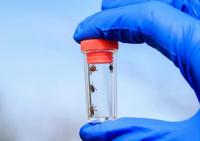
(Photo by SHVETS production via Pexels)
By Stephen Beech
Loss of smell due to COVID-19 may linger for years, warns a new study.
People who suspect that their sense of smell has been dulled following a bout of the COVID-19 virus are likely correct, according to research involving a 40-odour test.
Even those who do not notice any issues may be impaired, say American scientists.
A team of researchers from across the United States explored a link between the coronavirus that causes COVID-19 and hyposmia - the reduced ability to smell.
The results revealed that 80% of participants who reported a change in their smelling ability after having COVID-19 earned low scores on a clinical scent-detection test taken around two years later.
Of that group, 23% were severely impaired or had entirely lost their sense of smell.
Two out of three infected participants who did not notice any smelling issues (66%) scored "abnormally low" on the evaluation as well, according to the findings published in JAMA Network Open.

(Photo by SHVETS production via Pexels)
The study was led by the National Institutes of Health’s Recover initiative and supported by its Clinical Science Core at NYU Langone Health, in New York City.
Study co-lead author Professor Leora Horwitz said: “Our findings confirm that those with a history of COVID-19 may be especially at risk for a weakened sense of smell, an issue that is already under-recognised among the general population."
Horwitz, of NYU Grossman School of Medicine, says that 60% of uninfected participants who did not report olfactory problems also tested poorly during the clinical evaluation.
Hyposmia has previously been linked to weight loss, reduced quality of life, and depression, among other concerns.
People with a diminished sense of smell may also struggle to detect dangers such as spoiled food, gas leaks, and smoke.
Scientists have also flagged smelling dysfunction as an early sign of certain neurodegenerative disorders such as Parkinson’s disease and Alzheimer’s disease, which can affect the brain’s scent-processing region.
While previous research has identified hyposmia as a symptom of coronavirus infection, most of those studies have relied on patients’ own assessments of their smelling ability.
Horwitz says such subjective measures are not always reliable and can't effectively track the problem’s severity and persistence.
The new study involving 3,535 men and women is the largest to date to examine loss of smell after COVID-19 by using a formal test.

(Photo by cottonbro studio via Pexels)
The research team assessed thousands of American adults who had participated in the Recover study, a multi-centre analysis designed to shed light on the long-term health effects of coronavirus.
Participants with and without a history of COVID-19 completed surveys about their symptoms every 90 days from October 2021 through June 2025.
To measure olfactory function, the team used a clinical tool called the University of Pennsylvania Smell Identification Test (UPSIT).
In the "scratch-and-sniff" evaluation, which is considered the "gold standard" of its kind, participants were asked to identify 40 scents by selecting the right multiple-choice option for each odour.
A correct answer earned one point, and the total UPSIT score was compared with a database of thousands of healthy volunteers of the same sex.
Based on the results, smelling ability was characterised as normal, mildly impaired, moderately impaired, severely impaired, or lost altogether.
Horwitz said: “These results suggest that health care providers should consider testing for loss of smell as a routine part of post-COVID care."
She added: "While patients may not notice right away, a dulled nose can have a profound impact on their mental and physical well-being.”
Experts are now exploring ways to restore smelling ability after having COVID-19, including vitamin A supplementation and olfactory training to “rewire” the brain’s response to odours.
Horwitz says that having a deeper understanding of how the coronavirus affects the brain’s sensory and cognitive systems may help refine therapies.
She said that the research team did not directly assess loss of taste, which often accompanies problems with smell.






















(0) comments
Welcome to the discussion.
Log In
Keep it Clean. Please avoid obscene, vulgar, lewd, racist or sexually-oriented language.
PLEASE TURN OFF YOUR CAPS LOCK.
Don't Threaten. Threats of harming another person will not be tolerated.
Be Truthful. Don't knowingly lie about anyone or anything.
Be Nice. No racism, sexism or any sort of -ism that is degrading to another person.
Be Proactive. Use the 'Report' link on each comment to let us know of abusive posts.
Share with Us. We'd love to hear eyewitness accounts, the history behind an article.